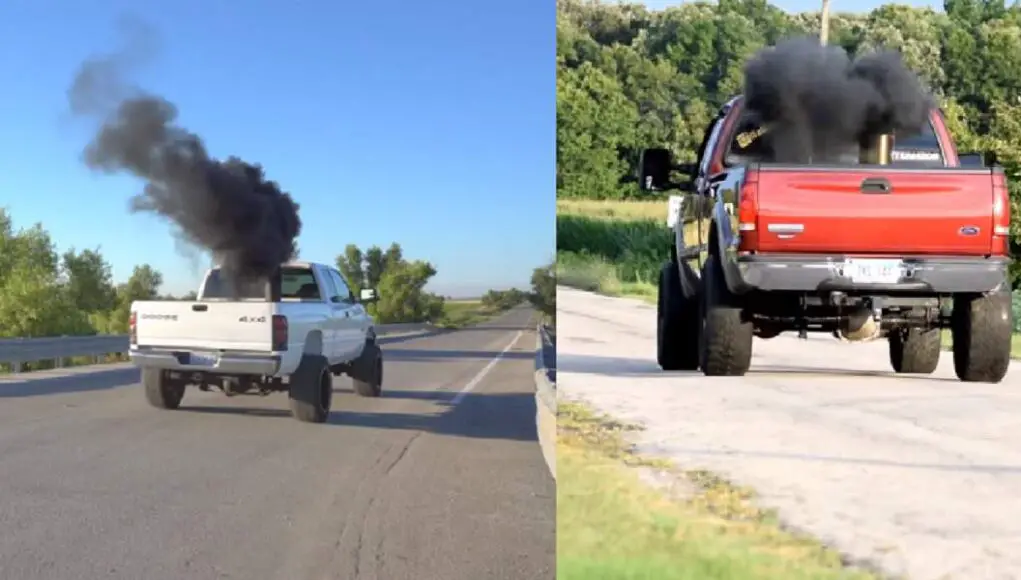Here’s why SEMA is pushing you to lobby congress now that certain aftermarket parts shops are being raided.
Sometime around 2019, the EPA (United States Environmental Protection Agency) really flexed their governmental oversight powers thanks to Title II of the Clean Air Act and announced its National Compliance Initiatives (NCI) Program for years 2020-2023. Among their six points, the EPA went after anyone involved in “sales of defeat devices for certain diesel trucks after 2009 and before 2020.” To put into lay-man’s terms, shops who did not care to hide they catered to someone who actively wanted to roll coal, delete their DPF systems, and straight pipe their exhausts were hit.
Embed from Getty ImagesIn the EPA’s press release published earlier this year, they declared that “by making aftermarket defeat devices a national priority, EPA is addressing a significant contributor to air pollution.”
Let me repeat that.
The EPA made this a “national priority” with the same laser-like focus they’re concentrating on with non-compliance of drinking water standards at a city level, reducing waste emissions from hazardous waste facilities, and dealing with the aftermath of Diesel-gate
The EPA is serious about this.
The EPA sent a clear message. Among the 31 Civil enforcement cases, the EPA hit Punch it Performance, Performance Diesel Inc., Freedom Performance LLC, Diesel Power Products, and Innovative Diesel LLC.
And the EPA has NOT let off the gas in 2021. Earlier this week the EPA fined Premier Performance out of Rexburg, Idaho $3 Million for “illegally selling emissions-control defeat devices to businesses and individuals throughout the U.S.”
The next day the EPA announced JB Automotive in Iowa, linked to Premier Performance, was also part of the aforementioned settlement. The EPA clearly delineated these cheating devices “Were designed and marketed for use on makes and models of diesel pickup trucks and engines manufactured by Cummins Inc., FCA US LLC, General Motors Company, and Ford Motor Company.”
And there were several other shops the EPA did not deem worthy of a press release but were also hit. Exhaust manufacturer Stainless Steel Works out of Chagrin Falls, OH announced the EPA made a stop at their shop with recommendations to not sell “off-road” versions of their header and downpipe systems without a high-flow catalytic converter, which they are now complying with.
Simply put, the EPA went after shops catering to Yee-Yee trucks.
Why should I care?
Unlike water pollutions which becomes painfully obvious when your neighbors get sick or your water turns a funny shade of brown, air pollution flies under the radar, so to speak. In the United States, you should have the expectation for some sort of clean air with some government oversight to guarantee you that “right.”
That’s where the Environmental Protection Agency comes in. Taking off your hat as a car enthusiast, they’re the government agency that makes sure justice is doled out long after the affects of past pollutants start to surface.
Bringing it back to our air and these latest EPA “raids,” the sale and use of these defeat devices is pumping out a lot of pollutants. How much? According to a UCS blog with stats from the EPA and MIT, settling with just H&S Performance back in 2017, one re-seller of emissions cheating devices, saved as much as two times the total amount of excess NOX emissions from two Diesel-gate events from being released into the air.
The EPA specifically is going after parts manufactures and exhaust shops violating the Clean Air Act of 1970 implemented as U.S. Code under Title 42, specifically under Section 7522, which makes it illegal to remove or render inoperative emissions devices originally installed on new cars or the manufacturing or selling of said devices.
What exactly is the RPM act and what good will it do?
The RPM Act A.K.A. the “Recognizing the Protection of Motorsports” act is not new. According to SEMA’s own website, it’s been around since 2015 in one form or another and is brought out and lobbied whenever SEMA deems what the EPA is doing is overreaching.
According to Automobile Mag, enough legislation using the RPM act, then called the RPM act of 2016, as a rallying cry forced the EPA to remove language in its greenhouse gas emissions bill that “would have made it illegal to turn street cars into track cars.”
Specifically, deep inside the legislation titled “Greenhouse Gas Emissions and Fuel Efficiency Standards for Medium- and Heavy-Duty Engines and Vehicles – Phase 2” was the provision that “Certified motor vehicles and motor vehicle engines and their emission control devices must remain in their certified configuration even if they are used solely for competition or if they become non-road vehicles or engines. “
The RPM act was brought out in 2017 to make it “permanent that race cars are exempt from EPA regulation via the Clean Air Act.”
And in 2021, SEMA is making a significant push, considering recent raids, to lobby your congressperson to recognize the “RPM Act of 2019” that amends the Clean Air Act specifically to prohibit the EPA to go after shops or manufacturers that install or make performance parts (that can be construed as emissions cheating) if those parts are for racecars, never to be used on the street or highway.
The Clean Air Act of 1970, specifically under Title 42, section 7522 would be amended to read,
“No action with respect to any device or element of design
referred to in paragraph (3) shall be treated as a prohibited act under that paragraph if the action is for the purpose of modifying a motor vehicle into a vehicle that is not legal for operation on a street or highway and is to be used solely for competition.”
SEMA says, like other RPM acts of year’s past,
“The bill clarifies that it is legal to make emissions-related changes to a street vehicle for the purpose of converting it into a racecar used exclusively in competition. It also confirms that it is legal to produce, market and install racing equipment. “
SEMA also clearly spells out,
“The RPM Act does not interfere with the EPA’s authority to enforce against individuals who illegally install race parts on vehicles driven on public roads and highways and the companies that market such products.”
The EPA even supports race cars, motorsport culture and, according to the current rule of law, does not focus on aftermarket parts for competition as long as you’re on a racetrack.
When the EPA removed that contentious paragraph that made it illegal to turn production cars into racecars in 2016 they stated,
“EPA supports motorsports and its contributions to the American economy and communities all across the country. EPA’s focus is not (nor has it ever been) on vehicles built or used exclusively for racing, but on companies that violate the rules by making and selling products that disable pollution controls on motor vehicles used on public roads.“
So, where’s the issue?
A breakdown by Repairer Driven News arrives at the crux of the issue,
Well, unfortunately, you can’t get from Point A — a legal, emissions-compliant road vehicle — to Point B — a legal, emissions-exempt competition vehicle — without breaking the law. Congress exempted the destination but failed to exempt the journey (the vehicle modifications). That’s what could put SEMA modders and manufacturers in jeopardy.
The EPA and aftermarket parts manufacturers are stuck between a rock and a hard place.
While this push from SEMA would have you believe they’re out to “protect motorsport” and “the average Joe racer with a Miata headed to weekend SCCA racing” in reality they are protecting the aftermarket parts manufactures and car owners the EPA is currently targeting, large truck owners who don’t want to deal with power-robbing catalytic converters, diesel exhaust fluid, and want to roal coal.
If you have an open mind, you really should read the entirety of UCS’s blog linked here, it’s an eye-opening exposé at what’s really at the heart of the issue, protecting profitable aftermarket industry that circumvents emissions devices under the guise of the good ol’ fashioned, red, white, and blue American motorsport industry.
On one hand, the EPA DOES say they support motorsport culture at its core but, on the other hand, they simply can’t turn a blind eye at aftermarket parts manufacturers and resellers that sell hardware and software that circumvents or deletes pollution-scrubbing technology from modern trucks and cars.
To think the EPA can’t see through the loophole the RPM act is trying to do, which is to make some emissions cheating devices available if they slap a “for competition use only” sticker on it, is playing the EPA for a bunch of fools.
Because even then, even the blind can see you can’t trust the average consumer to only use those parts for competition on legit racecars. Given the choice, besides more soot and noise, there are little downsides to deleting emission controls on diesels if you live outside of California and New York.
I don’t know where the middle ground is, but to expect congress to strip the EPA’s power to regulate at the source, the parts manufacturer, is wishful thinking.
With the progressive nature of this current administration, if you’re an industry profiting on the sales of devices the EPA is cracking down on, you don’t need a magic eight ball to see you need to pivot quick, because SEMA’s marketing push behind this RPM bill might not stick when it comes to a final vote.
And before you blame the likes of AOC and Biden for this crackdown, for the record, it was Trump’s EPA administration that introduced the EPA’s Priorities for compliance for 2020-2023.
So, for the immediate future, fines, yes, shutdowns, no, only if you willfully don’t comply.
And, will this RPM act stifle EPA’s roll against a certain demographic of the motorsport industry (yee-yee trucks?) I wouldn’t bet on it.





[…] What is the RPM Act & will the EPA fine or shutdown aftermarket parts shops & manufacturers … […]
I do not see the issue, those black stacking trucks have nothing to do with motorsports and should be banned. Now if they allow older cars to be modified and raced, then we return to older days of racing, and car prices for older rides will go up even further.. Just because they are late to the game because the elite used their money to evade regulations does not mean we should continue to pollute, the logic there is flawed.. Again my 69 GS is worth more now, as with rest of my collection, that is fine to me.. And if we all raced electric rides, we would be better off anyhow, more powerful drivetrains, can’t wait…
Actually i do not see the problem with the trucks that are spitting out black smoke. its called rolling coal and how it works is the vehicle that is rolling coal must be a diesel, i basically works by injecting diesel into the muffler. its not doing as much environmental damage because diesel burns way cleaner than gas does.
You are scientifically incorrect on every level. Rolling coal is like burning tires in the backyard to piss off your neighbors- m******, ignorant, and spiteful. It has nothing to do with racing, and Yee-Yee truck divers have ZERO crossover in the racing world. These trucks are only about statement, being an **s, and flaunting a low IQ. If you like *****y air so much then go back to 1978 and sit in the smoking section of a waffle house
Couldn’t have said it better. Rolling coal is one of the dumbest things I’ve ever seen
PFI Speed in Colorado got a fine from the EPA. They primarily tune Hondas and regularly show themselves and people they know racing at the drag strip, or in scca events. (never on the streets or in “Mexico”) The shop has a youtube channel that is now documenting the process of what happens next. When the EPA approached their business they asked PFI for sales records to include who purchased the products. Initially they talked about paying the fine and just moving forward but after speaking with lawyers found out the EPA is also mandating they agree to not tune vehicles again and could still be fined retroactively if the EPA found any other violations.